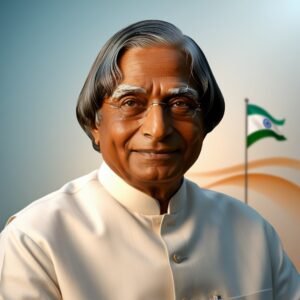
Growing up in a modest household, Kalam was surrounded by the values of hard work and integrity, instilled by his parents. His father was a boat owner, and his mother took care of their large family. Though they had little money, he was rich in curiosity and a thirst for knowledge. He was an eager learner, often up before dawn to study, and spent his free time watching birds fly, sparking his fascination with the science of flight.
Despite financial challenges, this intellectual’s unwavering dedication to education saw him through school and into the prestigious Madras Institute of Technology (MIT). This was no small feat for a boy from a small town. But even as the path ahead was daunting, his family stood by him, with his sister even mortgaging her jewelry to pay his college fees. This act of sacrifice was not in vain; he graduated with a degree in aeronautical engineering, ready to chase his dreams of flying high—literally and figuratively.
Kalam’s early career began at the Defence Research and Development Organization (DRDO), where he worked on designing a small hovercraft. But it wasn’t until he joined the Indian Space Research Organization (ISRO) in 1969 that his career truly took off. Here, he led the project that launched India’s first satellite into space, marking the country’s entry into the global space race. This achievement was just the beginning.
Interestingly, soon became a key figure in India’s defense technology, spearheading the development of ballistic missiles under the Integrated Guided Missile Development Program (IGMDP). His work on projects like Agni and Prithvi missiles earned him the nickname “Missile Man of India,” a title that reflects his contributions to strengthening India’s defense capabilities.
But Kalam was not just a scientist. His wisdom, humility, and vision for India’s future led him to the highest office in the land. In 2002, he was elected the 11th President of India. As President, Kalam brought a new energy to the role, connecting with citizens, especially young people, with his down-to-earth personality and infectious optimism. He wasn’t just a leader; he was a mentor to millions, urging the youth to dream big and work hard.
Even after his presidency, Kalam remained dedicated to education and innovation. He spent his later years traveling across India, speaking to students, encouraging them to think creatively, and reminding them that the future of India rested in their hands.
Dr. APJ Abdul Kalam’s journey from a small town boy to the President of India is more than just a story of personal success. It’s an inspiring testament to what is possible when we dare to dream, work tirelessly to achieve those dreams, and never forget our roots. His life continues to inspire generations, reminding us that with passion, perseverance, and a strong sense of purpose, we can achieve the extraordinary.
Related links to refer:
1. Abdul Kalam